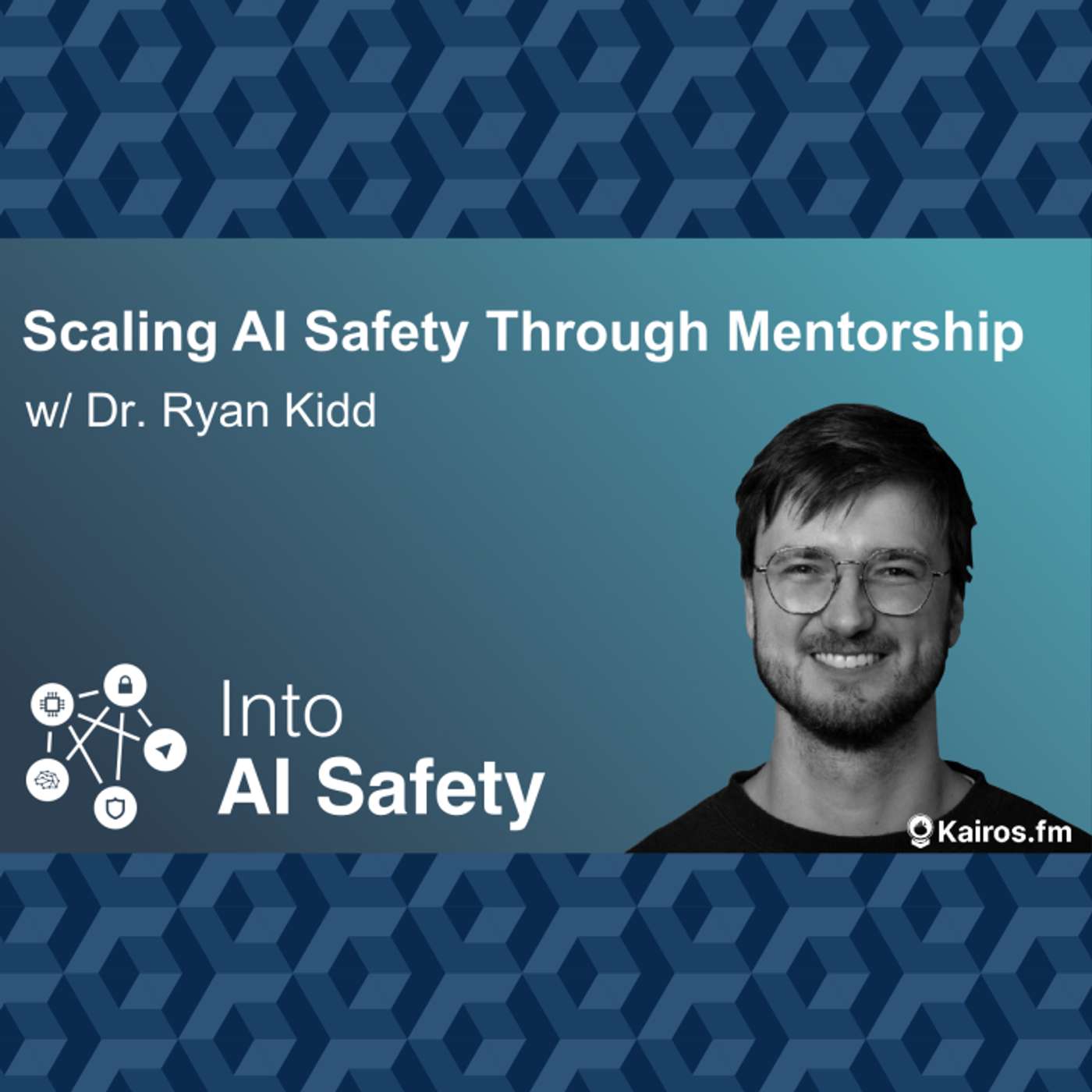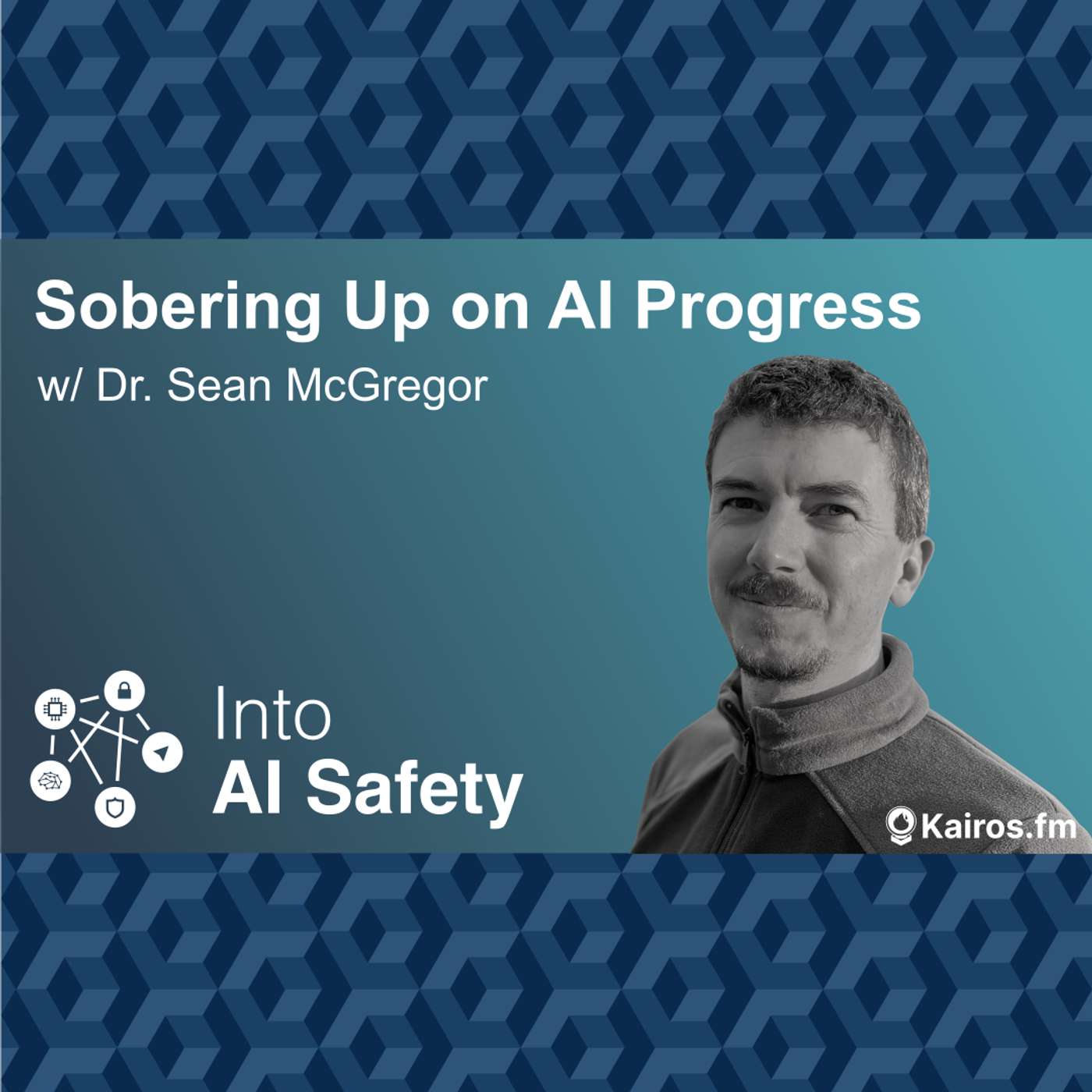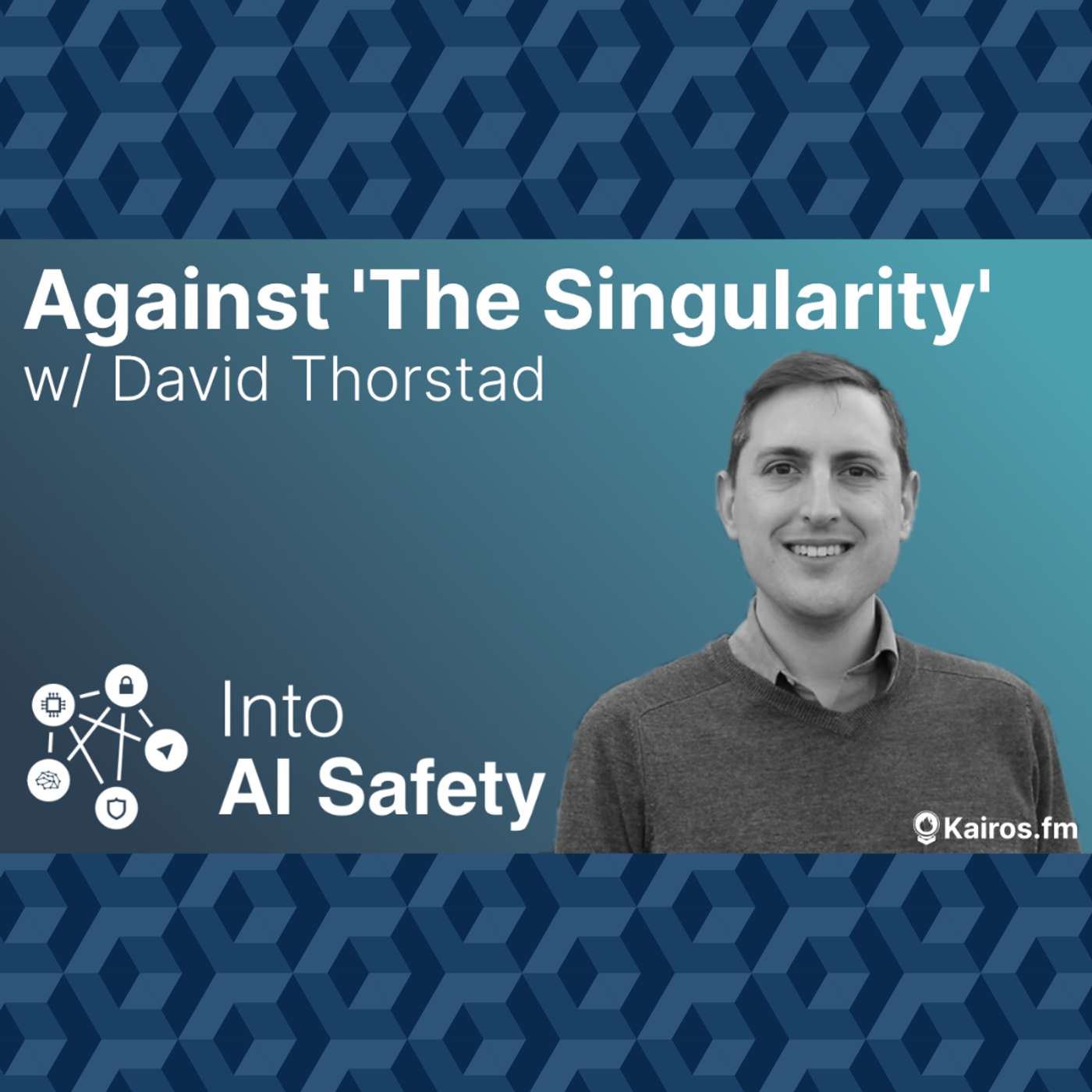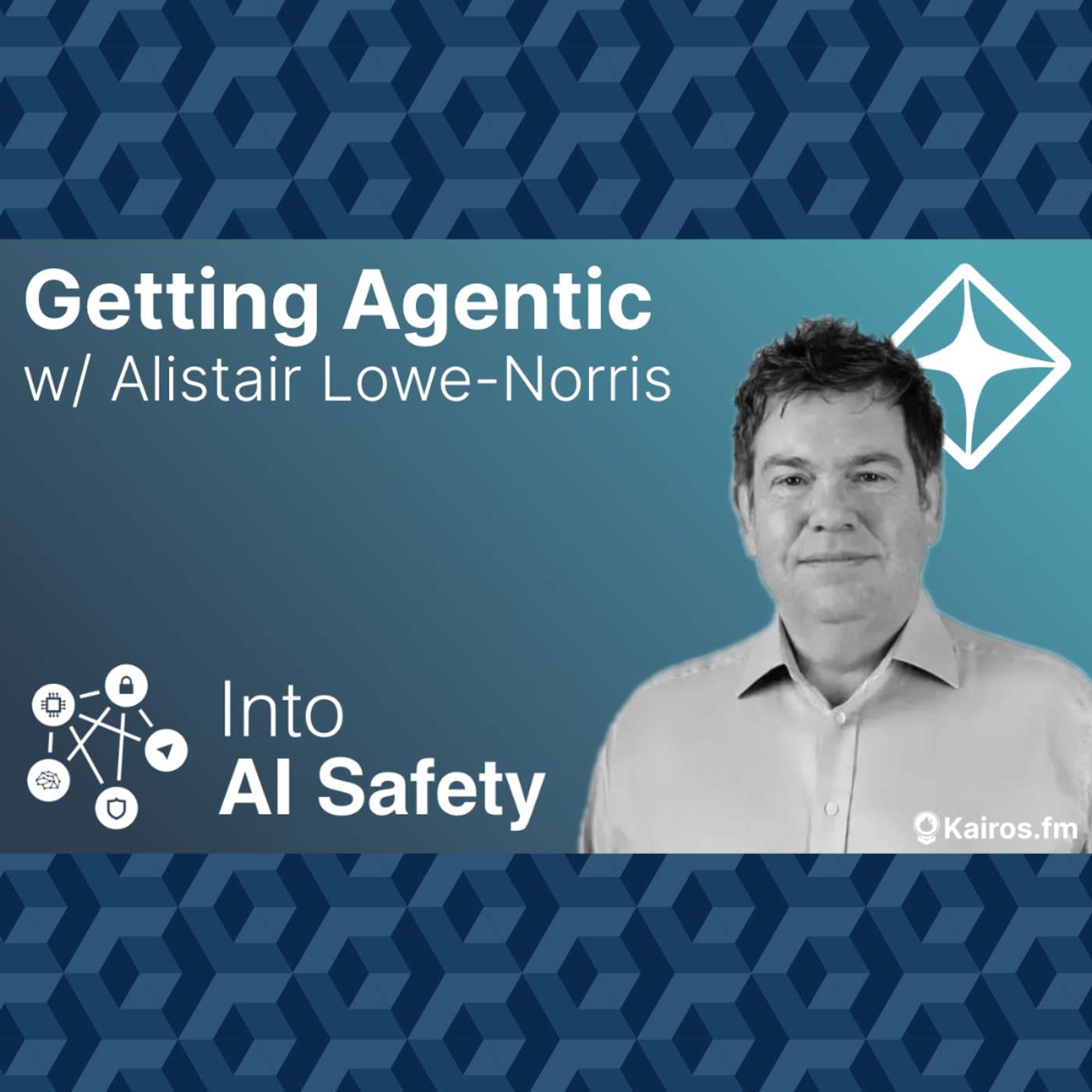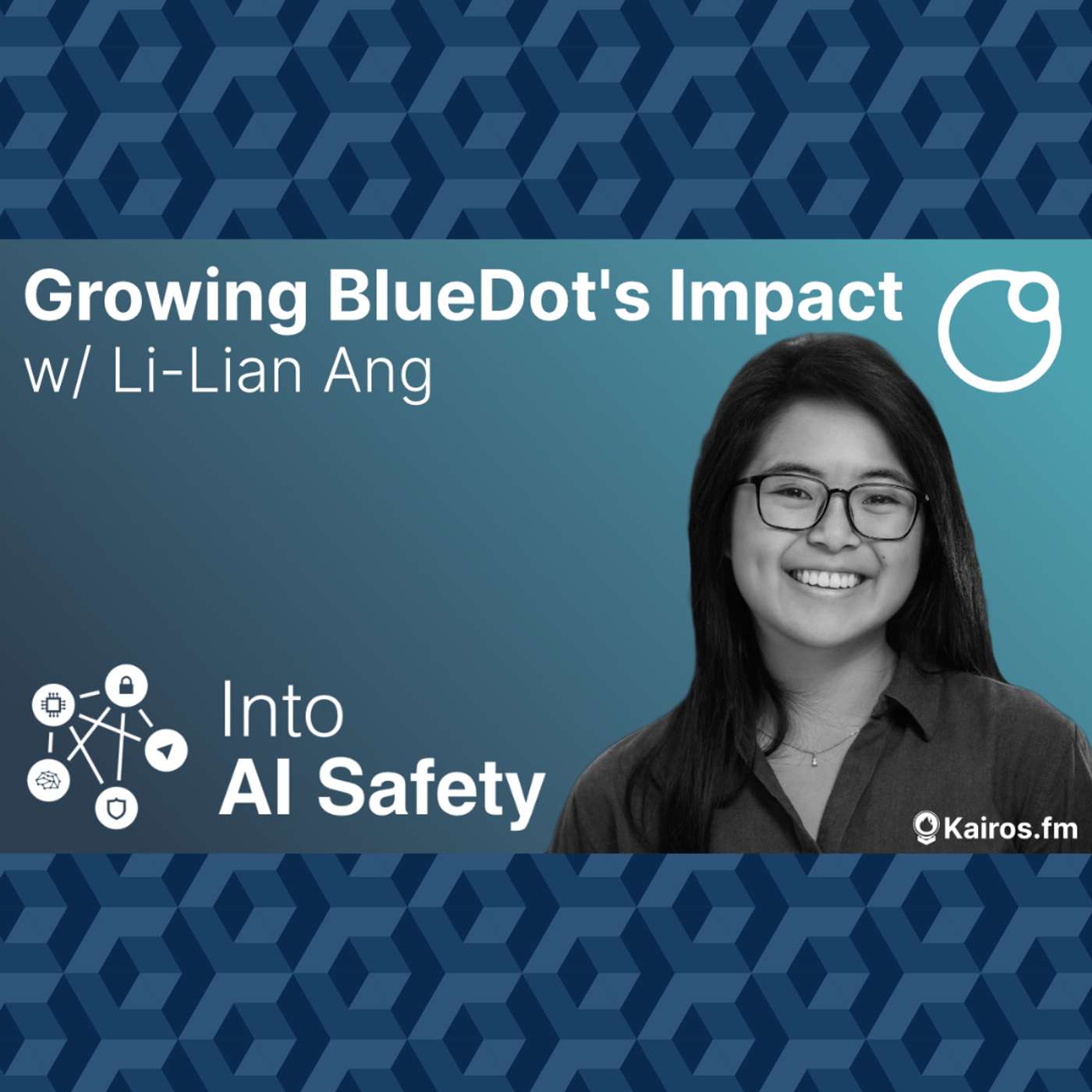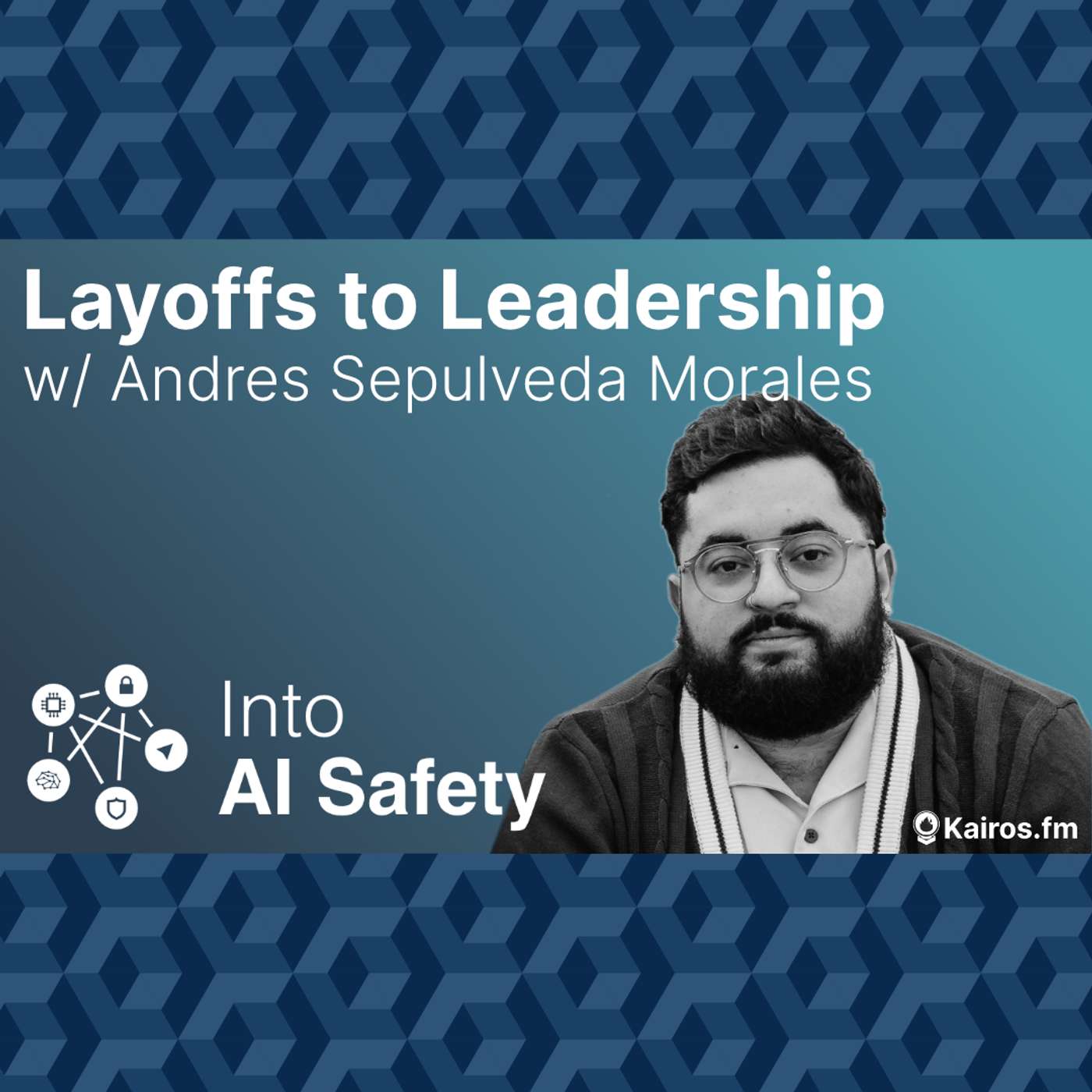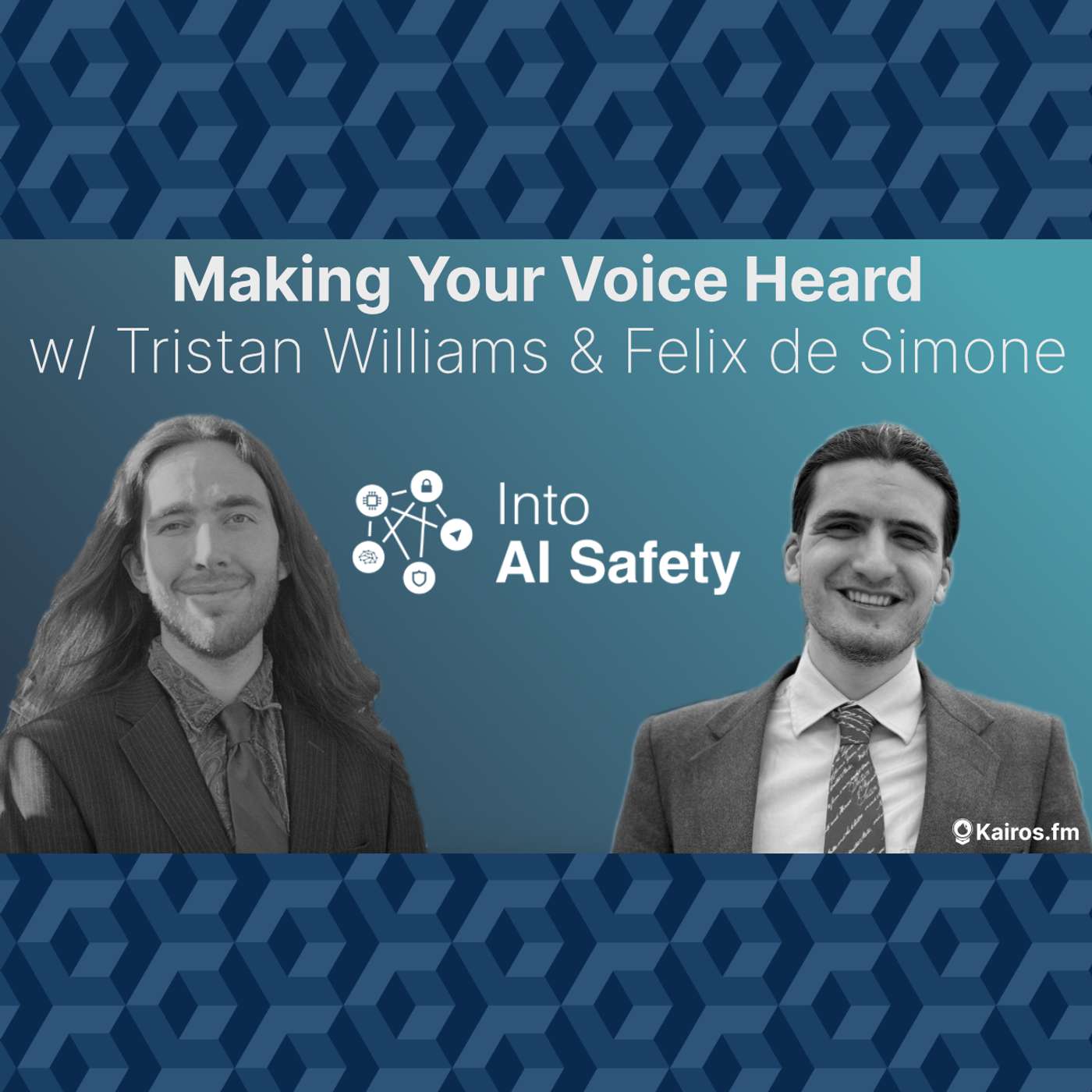Discover Into AI Safety
Into AI Safety

Into AI Safety
Author: Jacob Haimes
Subscribed: 4Played: 17Subscribe
Share
© Kairos.fm
Description
The Into AI Safety podcast aims to make it easier for everyone, regardless of background, to get meaningfully involved with the conversations surrounding the rules and regulations which should govern the research, development, deployment, and use of the technologies encompassed by the term "artificial intelligence" or "AI"
For better formatted show notes, additional resources, and more, go to https://kairos.fm/intoaisafety/
For better formatted show notes, additional resources, and more, go to https://kairos.fm/intoaisafety/
27 Episodes
Reverse
What does it actually take to build a successful AI safety organization? I'm joined by Dr. Ryan Kidd, who has co-led MATS from a small pilot program to one of the field's premier talent pipelines. In this episode, he reveals the low-hanging fruit in AI safety field-building that most people are missing: the amplifier archetype.I pushed Ryan on some hard questions, from balancing funder priorities and research independence, to building a robust selection process for both mentors and participants. Whether you're considering a career pivot into AI safety or already working in the field, this conversation offers practical advice on how to actually make an impact.Chapters(00:00) - - Intro
(08:16) - - Building MATS Post-FTX & Summer of Love
(13:09) - - Balancing Funder Priorities and Research Independence
(19:44) - - The MATS Selection Process
(33:15) - - Talent Archetypes in AI Safety
(50:22) - - Comparative Advantage and Career Capital in AI Safety
(01:04:35) - - Building the AI Safety Ecosystem
(01:15:28) - - What Makes a Great AI Safety Amplifier
(01:21:44) - - Lightning Round Questions
(01:30:30) - - Final Thoughts & Outro
LinksMATSRyan's WritingLessWrong post - Talent needs of technical AI safety teamsLessWrong post - AI safety undervalues foundersLessWrong comment - Comment permalink with 2025 MATS program detailsLessWrong post - Talk: AI Safety Fieldbuilding at MATSLessWrong post - MATS Mentor SelectionLessWrong post - Why I funded PIBBSSEA Forum post - How MATS addresses mass movement building concernsFTX Funding of AI SafetyLessWrong blogpost - An Overview of the AI Safety Funding SituationFortune article - Why Sam Bankman-Fried’s FTX debacle is roiling A.I. researchNY Times article - FTX probes $6.5M in payments to AI safety group amid clawback crusadeCointelegraph article - FTX probes $6.5M in payments to AI safety group amid clawback crusadeFTX Future Fund article - Future Fund June 2022 Update (archive)Tracxn page - Anthropic Funding and InvestorsTraining & Support ProgramsCatalyze ImpactSeldon LabSPARBlueDot ImpactYCombinatorPivotalAthenaAstra FellowshipHorizon FellowshipBASE FellowshipLASR LabsEntrepeneur FirstFunding OrganizationsCoefficient Giving (previously Open Philanthropy)LTFFLongview PhilanthropyRenaissance PhilanthropyCoworking SpacesLISAMoxLighthavenFAR LabsConstellationColliderNET OfficeBAISHResearch Organizations & StartupsAtla AIApollo ResearchTimaeusRAND CASTCHAIOther SourcesAXRP website - The AI X-risk Research PodcastLessWrong blogpost - Shard Theory: An Overview
Sean McGregor and I discuss about why evaluating AI systems has become so difficult; we cover everything from the breakdown of benchmarking, how incentives shape safety work, and what approaches like BenchRisk (his recent paper at NeurIPS) and AI auditing aim to fix as systems move into the real world. We also talk about his history and journey in AI safety, including his PhD on ML for public policy, how he started the AI Incident Database, and what he's working on now: AVERI, a non-profit for frontier model auditing.Chapters(00:00) - Intro
(02:36) - What's broken about benchmarking
(03:41) - Sean’s wild PhD
(14:28) - The phantom internship
(19:25) - Sean's journey
(22:25) - Market-vs-regulatory modes and AIID
(32:13) - Drunk on AI progress
(38:34) - BenchRisk
(43:20) - Moral hazards and Master Hand
(50:34) - Liability, Section 230, and open source
(59:20) - AVERI
(01:11:30) - Closing thoughts & outro
LinksSean McGregor's websiteAVERI websiteBenchRiskBenchRisk websiteNeurIPS paper - Risk Management for Mitigating Benchmark Failure Modes: BenchRiskNeurIPS paper - AI and the Everything in the Whole Wide World BenchmarkAIIDAI Incident Database websiteIAAI paper - Preventing Repeated Real World AI Failures by Cataloging Incidents: The AI Incident DatabasePreprint - Lessons for Editors of AI Incidents from the AI Incident DatabaseAIAAIC website (another incident tracker)Hot AI SummerCACM article - A Few Useful Things to Know About Machine LearningCACM article - How the AI Boom Went BustUndergraduate Thesis - Analyzing the Prospect of an Approaching AI WinterTech Genies article - AI History: The First Summer and Winter of AICACM article - There Was No ‘First AI Winter’Measuring GeneralizationNeural Computation article - The Lack of A Priori Distinctions Between Learning AlgorithmsICLR paper - Understanding deep learning requires rethinking generalizationICML paper - Model-agnostic Measure of Generalization DifficultyRadiology Artificial Intelligence article - Generalizability of Machine Learning Models: Quantitative Evaluation of Three Methodological PitfallsPreprint - Quantifying Generalization Complexity for Large Language ModelsInsurers Exclude AIFinancial Times article - Insurers retreat from AI cover as risk of multibillion-dollar claims mountTom's Hardware article - Major insurers move to avoid liability for AI lawsuits as multi-billion dollar risks emerge — Recent public incidents have lead to costly repercussionsInsurance Newsnet article - Insurers Scale Back AI Coverage Amid Fears of Billion-Dollar ClaimsInsurance Business article - Insurance’s gen AI reckoning has comeSection 230Section 230 overviewLegal sidebar - Section 230 Immunity and Generative Artificial IntelligenceBad Internet Bills websiteTechDirt article - Section 230 Faces Repeal. Support The Coverage That’s Been Getting It Right All Along.Privacy Guides video - Dissecting Bad Internet Bills with Taylor Lorenz: KOSA, SCREEN Act, Section 230Journal of Technology in Behavioral Health article - Social Media and Mental Health: Benefits, Risks, and Opportunities for Research and PracticeTime article - Lawmakers Unveil New Bills to Curb Big Tech’s Power and ProfitHouse Hearing transcript - Legislative Solutions to Protect Children and Teens OnlineRelevant Kairos.fm EpisodesInto AI Safety episode - Growing BlueDot's Impact w/ Li-Lian AngmuckrAIkers episode - NeurIPS 2024 Wrapped 🌯Other LinksEncyclopedia of Life websiteIBM Watson AI XPRIZE websiteML Commons websiteWikipedia article
Philosopher Dr. David Thorstad tears into one of AI safety's most influential arguments: the singularity hypothesis. We discuss why the idea of recursive self-improvement leading to superintelligence doesn't hold up under scrutiny, how these arguments have redirected hundreds of millions in funding away from proven interventions, and why people keep backpedaling to weaker versions when challenged.David walks through the actual structure of singularity arguments, explains why similar patterns show up in other longtermist claims, and makes the case for why we should focus on concrete problems happening right now like poverty, disease, the rise of authoritarianism instead of speculative far-future scenarios.Chapters(00:00) - Intro
(02:13) - David's background
(08:00) - (Against) The Singularity Hypothesis
(29:46) - Beyond the The Singularity
(39:56) - What We Should Actually Be Worried About
(49:00) - Philanthropic Funding
LinksDavid's personal websiteReflective Altruism, David's blogThe Singularity HypothesisDavid's Philosophical Studies article - Against the singularity hypothesisTime "AI Dictionary" page - SingularityEA Forum blogpost - Summary: Against the singularity hypothesisJournal of Conciousness Studies article - The Singularity: A Philisophical AnalysisInterim Report from the Panel Chairs: AAAI Presidential Panel on Long-Term AI FuturesEpoch AI blogpost - Do the returns to software R&D point towards a singularity?Epoch AI report - Estimating Idea Production: A Methodological SurveyFunding ReferencesLessWrong blogpost - An Overview of the AI Safety Funding SituationAISafety.com funding pageReport - Stanford AI Index 2025, Chapter 4.3Forbes article - AI Spending To Exceed A Quarter Trillion Next YearAI Panic article - The “AI Existential Risk” Industrial ComplexGiveWell webpage - How Much Does It Cost To Save a Life?Wikipedia article - Purchasing power parityPascal's Mugging and the St. Petersburg ParadoxWikipedia article - St. Petersburg ParadoxConjecture Magazine article - Pascal’s Mugging and Bad Explanationsneurabites explainer - Ergodicity: the Most Over-Looked AssumptionWikipedia article - Extraordinary claims require extraordinary evidenceThe Time of PerilsGlobal Priorities Institute working paper - Existential risk pessimism and the time of perilsEthics article - Mistakes in the Moral Mathematics of Existential RiskPhilosophy & Public Affairs article - High Risk, Low Reward: A Challenge to the Astronomical Value of Existential Risk MitigationToby Ord Book - The PrecipiceRethink Priorities blogpost - Charting the precipiceAI Futures Project blogpost - AI 2027Trump's Higher Education Threat CompactWikipedia article - Compact for Academic Excellence in Higher EducationPen America explainer - What is Trump’s Compact for Higher Education? And More Frequently Asked QuestionsStatement by the Vanderbilt AAUP Executive Committee on the “Compact for Academic Excellence in Higher Education”The Vanderbilt Hustler article - BREAKING: Chancellor Daniel Diermeier fails to reject higher education compact, reaffirms Vanderbilt’s values and openness to discussionThe Vanderbilt Hustler article - Students and faculty organize rally outside Kirkland Hall against Trump administration’s higher education compactFree Speech Center article - Compact for Academic ExcellenceMore of David's WorkGlobal Priorities Institute working paper - What power-seeking theorems do not showBook - Essays on LongtermismVibe ShiftBlood in the Machine article - GPT-5 Is a Joke. Will It Matter?Futurism article - Evidence Grows That GPT-5 Is a Bit of a DudGary Marcus substack - GPT-5: Overdue, overhyped and underwhelming. And that’s not the worst of it.Pew Research report - How the U.S. Public and AI Experts View Artificial IntelligenceN...
Alistair Lowe-Norris, Chief Responsible AI Officer at Iridius and co-host of The Agentic Insider podcast, joins to discuss AI compliance standards, the importance of narrowly scoping systems, and how procurement requirements could encourage responsible AI adoption across industries. We explore the gap between the empty promises companies provide and actual safety practices, as well as the importance of vigilance and continuous oversight.Listen to Alistair on his podcast, The Agentic Insider!As part of my effort to make this whole podcasting thing more sustainable, I have created a Kairos.fm Patreon which includes an extended version of this episode. Supporting gets you access to these extended cuts, as well as other perks in development.Chapters(00:00) - Intro
(02:46) - Trustworthy AI and the Human Side of Change
(13:57) - This is Essentially Avatar, Right?
(23:00) - AI Call Centers
(49:38) - Standards, Audits, and Accountability
(01:04:11) - What Happens when Standards aren’t Met?
LinksIridius websiteGPT-5 CommentaryWhere's Your Ed At blogpost - How Does GPT-5 Work?Zvi LessWrong blogpost - GPT-5: The Reverse DeepSeek momentBlood in the Machine article - GPT-5 Is a Joke. Will It Matter?Futurism article - Evidence Grows That GPT-5 Is a Bit of a DudGary Marcus substack - GPT-5: Overdue, overhyped and underwhelming. And that’s not the worst of it.Customer Service and AI AdoptionGartner press release - Gartner Survey Finds 64% of Customers Would Prefer That Companies Didn't Use AI for Customer ServicePreprint - Deploying Chatbots in Customer Service: Adoption Hurdles and Simple RemediesKDD '25 paper - Retrieval And Structuring Augmented Generation with Large Language ModelsGlobal Nerdy blogpost - Retrieval-augmented generation explained “Star Wars” styleThe Security Cafe article - A Quick And Dirty Guide To Starting SOC2StandardsISO overview - AI management systemsISO standard - ISO/IEC 42001CyberZoni guide - ISO 42001 The Complete GuideA-LIGN article - Understanding ISO 42001ISO standard - ISO/IEC 27001ISO standard - ISO/IEC 42005Governance and RegulationNIST framework - AI Risk Management FrameworkEU AI Act article - Article 99: PenaltiesColorado Senate Bill 24-205 (Colorado AI Act) webpageUtah Senate Bill 149 webpageMicrosoft AI ComplianceSchellman blogpost - Microsoft DPR AI Requirements and ISO 42001Microsoft documentation - ISO/IEC 42001 AI Management System offeringMicrosoft webpage - Responsible AI Principles and ApproachMicrosoft Service Trust Portal documentation - Responsible AI Standard v2Microsoft documentation - Supplier Security & Privacy Assurance Program Guide v11 April 2025
I'm joined by my good friend, Li-Lian Ang, first hire and product manager at BlueDot Impact. We discuss how BlueDot has evolved from their original course offerings to a new "defense-in-depth" approach, which focuses on three core threat models: reduced oversight in high risk scenarios (e.g. accelerated warfare), catastrophic terrorism (e.g. rogue actors with bioweapons), and the concentration of wealth and power (e.g. supercharged surveillance states). On top of that, we cover how BlueDot's strategies account for and reduce the negative impacts of common issues in AI safety, including exclusionary tendencies, elitism, and echo chambers.2025.09.15: Learn more about how to make design effective interventions to make AI go well and potentially even get funded for it on BlueDot Impact's AGI Strategy course! BlueDot is also hiring, so if you think you’d be a good fit, I definitely recommend applying; I had a great experience when I contracted as a course facilitator. If you do end up applying, let them know you found out about the opportunity from the podcast!Follow Li-Lian on LinkedIn, and look at more of her work on her blog!As part of my effort to make this whole podcasting thing more sustainable, I have created a Kairos.fm Patreon which includes an extended version of this episode. Supporting gets you access to these extended cuts, as well as other perks in development.(03:23) - Meeting Through the Course
(05:46) - Eating Your Own Dog Food
(13:13) - Impact Acceleration
(22:13) - Breaking Out of the AI Safety Mold
(26:06) - Bluedot’s Risk Framework
(41:38) - Dangers of "Frontier" Models
(54:06) - The Need for AI Safety Advocates
(01:00:11) - Hot Takes and Pet Peeves
LinksBlueDot Impact websiteDefense-in-DepthBlueDot Impact blogpost - Our vision for comprehensive AI safety trainingEngineering for Humans blogpost - The Swiss cheese model: Designing to reduce catastrophic lossesOpen Journal of Safety Science and Technology article - The Evolution of Defense in Depth Approach: A Cross Sectorial AnalysisX-clusion and X-riskNature article - AI Safety for EveryoneBen Kuhn blogpost - On being welcomingReflective Altruism blogpost - Belonging (Part 1: That Bostrom email)AIxBioRAND report - The Operational Risks of AI in Large-Scale Biological AttacksOpenAI "publication" (press release) - Building an early warning system for LLM-aided biological threat creationAnthropic Frontier AI Red Team blogpost - Why do we take LLMs seriously as a potential source of biorisk?Kevin Esvelt preprint - Foundation models may exhibit staged progression in novel CBRN threat disclosureAnthropic press release - Activating AI Safety Level 3 protectionsPersuasive AIPreprint - Lies, Damned Lies, and Distributional Language Statistics: Persuasion and Deception with Large Language ModelsNature Human Behavior article - On the conversational persuasiveness of GPT-4Preprint - Large Language Models Are More Persuasive Than Incentivized Human PersuadersAI, Anthropomorphization, and Mental HealthWestern News article - Expert insight: Humanlike chatbots detract from developing AI for the human goodAI & Society article - Anthropomorphization and beyond: conceptualizing humanwashing of AI-enabled machinesArtificial Ignorance article - The Chatbot TrapMaking Noise and Hearing Things blogpost - Large language models cannot replace mental health professionalsIdealogo blogpost - 4 reasons not to turn ChatGPT into your therapistJournal of Medical Society Editorial - Importance of informed consent in medical practiceIndian Journal of Medical Research article - Consent in psychiatry - concept, application & implicationsMedia Naama article - The Risk of Humanising AI Chabots: Why ChatGPT Mimicking Feelings Can BackfireBecker's Behavioral Health blogpost - OpenAI’s mental health roadmap: 5 things to knowMiscellaneous ReferencesCarnegie Council blogpost - What Do We Mean When We Talk About "AI Democratization"?Collective Intelligence Project policy brief - Four Approaches to Democratizing AIBlueDot Impact blogpost - How Does AI Learn? A Beginner's Guide with ExamplesBlueDot Impact blogpost - AI safety needs more public-facing advocacyMore Li-Lian LinksHumans of Minerva podcast websiteLi-Lian's book - Purple is the Noblest ShroudRelevant Podcasts from Kairos.fmScaling Democracy w/ Dr. Igor Krawczuk for AI safety exclusion and echo chambersGetting into PauseAI w/ Will Petillo for AI in warfare and exclusion in AI safety
Andres Sepulveda Morales joins me to discuss his journey from three tech layoffs to founding Red Mage Creative and leading the Fort Collins chapter of the Rocky Mountain AI Interest Group (RMAIIG). We explore the current tech job market, AI anxiety in nonprofits, dark patterns in AI systems, and building inclusive tech communities that welcome diverse perspectives.Reach out to Andres on his LinkedIn, or check out the Red Mage Creative website!For any listeners in Colorado, consider attending an RMAIIG event: Boulder; Fort Collins(00:00) - Intro
(01:04) - Andres' Journey
(05:15) - Tech Layoff Cycle
(26:12) - Why AI?
(30:58) - What is Red Mage?
(36:12) - AI as a Tool
(41:55) - AInxiety
(47:26) - Dark Patterns and Critical Perspectives
(01:01:35) - RMAIIG
(01:10:09) - Inclusive Tech Education
(01:18:05) - Colorado AI Governance
(01:23:46) - Building Your Own Tech Community
LinksTech Job MarketLayoff tracker websiteThe Big Newsletter article - Why Are We Pretending AI Is Going to Take All the Jobs?METR preprint - Measuring the Impact of Early-2025 AI on Experienced Open-Source Developer ProductivityAI Business blogpost - https://aibusiness.com/responsible-ai/debunking-the-ai-job-crisisCrunchbase article - Data: Tech Layoffs Remain Stubbornly High, With Big Tech Leading The WayComputerworld article - Tech layoffs surge even as US unemployment remains stableApollo Technical blogpost - Ghost jobs in tech: Why companies are posting roles they don’t plan to fillThe HR Digest article - The Rise of Ghost Jobs Is Leaving Job Seekers Frustrated and DisappointedA Life After Layoff video - The Tech Job Market Is Hot Trash Right NowEconomy Media video - Will The Tech Job Market Ever Recover?Soleyman Shahir video - Tech CEO Explains: The Real Reason Behind AI LayoffsDark PatternsDeceptive Design websiteJournal of Legal Analysis article - Shining a Light on Dark PatternsICLR paper - DarkBench: Benchmarking Dark Patterns in Large Language ModelsComputing Within Limits paper - Imposing AI: Deceptive design patterns against sustainabilityCommunications of the ACM blogpost - Dark Patterns[Preprint] - A Comprehensive Study on Dark PatternsColorado AI RegulationSenate Bill 24-205 (Colorado AI Act) bill and webpageNAAG article - A Deep Dive into Colorado’s Artificial Intelligence ActColorado Sun article - Why Colorado’s artificial intelligence law is a big deal for the whole countryCFO Dive blogpost - ‘Heavy lift’: Colorado AI law sets high bar, analysts sayDenver 7 article - Colorado could lose federal funding as Trump administration targets AI regulationsAmerica's AI Action Plan documentOther SourcesConcordia Framework report and repo80,000 Hours websiteAI Incident Database website
Will Petillo, onboarding team lead at PauseAI, joins me to discuss the grassroots movement advocating for a pause on frontier AI model development. We explore PauseAI's strategy, talk about common misconceptions Will hears, and dig into how diverse perspectives still converge on the need to slow down AI development.Will's LinksPersonal blog on AIHis mindmap of the AI x-risk debateGame demosAI focused YouTube channel(00:00) - Intro
(03:36) - What is PauseAI
(10:10) - Will Petillo's journey into AI safety advocacy
(21:13) - Understanding PauseAI
(31:35) - Pursuing a pause
(40:06) - Balancing advocacy in a complex world
(45:54) - Why a pause on frontier models?
(54:48) - Diverse perspectives within PauseAI
(59:55) - PauseAI misconceptions
(01:16:40) - Ongoing AI governance efforts (SB1047)
(01:28:52) - The role of incremental progress
(01:35:16) - Safety-washing and corporate responsibility
(01:37:23) - Lessons from environmentalism
(01:41:59) - Will's superlatives
LinksPauseAIPauseAI-USRelated Kairos.fm EpisodesInto AI Safety episode with Dr. Igor KrawczukmuckrAIkers episode on SB1047Exclusionary TendenciesJacobin article - Elite Universities Gave Us Effective Altruism, the Dumbest Idea of the CenturySSIR article - The Elitist Philanthropy of So-Called Effective AltruismPersuasion blogpost - The Problem with Effective AltruismDark Markets blogpost - What's So Bad About Rationalism?FEE blogpost - What’s Wrong With the Rationality Community?AI in WarfareMaster's Thesis - The Evolution of Artificial Intelligence and Expert Computer Systems in the ArmyInternational Journal of Intelligent Systems article - Artificial Intelligence in the Military: An Overview of the Capabilities, Applications, and ChallengesPreprint - Basic Research, Lethal Effects: Military AI Research Funding as EnlistmentAOAV Article - ‘Military Age Males’ in US Drone StrikesThe Conversation article - Gaza war: Israel using AI to identify human targets raising fears that innocents are being caught in the net972 article - ‘Lavender’: The AI machine directing Israel’s bombing spree in GazaIDF press release - The IDF's Use of Data Technologies in Intelligence ProcessingLieber Institute West Point article - Israel–Hamas 2024 SymposiumVerfassungsblog article - Gaza, Artificial Intelligence, and Kill ListsRAND research report - Dr. Li Bicheng, or How China Learned to Stop Worrying and Love Social Media ManipulationThe Intercept article collection - The Drone PapersAFIT faculty publication - On Large Language Models in National Security ApplicationsNature article - Death by Metadata: The Bioinformationalisation of Life and the Transliteration of Algorithms to FleshLegislationLegiScan page on SB1047NY State Senate page on the RAISE ActCongress page on the TAKE IT DOWN ActThe GavernorFastCompany article - Big Tech may be focusing its lobbying push on the California AI safety bill’s last stop: Gavin NewsomPOLITICO article - How California politics killed a nationally important AI billNewsom's veto messageAdditional relevant lobbying documentation - [1], [2]Jacobin article - With Newsom’s Veto, Big Tech Beats DemocracyMisc. LinksFLI Open Letter on an AI pauseWikipedia article - Overton windowDaniel Smachtenburger YouTube video - An Introduction to the MetacrisisVAISU website (looks broken as of 2025.06.19)AI Impacts report - Why Did Environmentalism Become Partisan?
I am joined by Tristan Williams and Felix de Simone to discuss their work on the potential of constituent communication, specifically in the context of AI legislation. These two worked as part of an AI Safety Camp team to understand whether or not it would be useful for more people to be sharing their experiences, concerns, and opinions with their government representative (hint, it is).Check out the blogpost on their findings, "Talking to Congress: Can constituents contacting their legislator influence policy?" and the tool they created!(01:53) - Introductions
(04:04) - Starting the project
(13:30) - Project overview
(16:36) - Understanding constituent communication
(28:50) - Literature review
(35:52) - Phase 2
(43:26) - Creating a tool for citizen engagement
(50:16) - Crafting your message
(59:40) - The game of advocacy
(01:15:19) - Difficulties on the project
(01:22:33) - Call to action
(01:32:30) - Outro
LinksLinks to all articles/papers which are mentioned throughout the episode can be found below, in order of their appearance.AI Safety CampPause AIBlueDot ImpactTIME article - There’s an AI Lobbying Frenzy in Washington. Big Tech Is DominatingCongressional Management Foundation study - Communicating with Congress: Perceptions of Citizen Advocacy on Capitol HillCongressional Management Foundation study - The Future of Citizen Engagement: Rebuilding the Democratic DialogueTristan and Felix's blogpost - Talking to Congress: Can constituents contacting their legislator influence policy?Wired article - What It Takes to Make Congress Actually ListenAmerican Journal of Polical Science article - Congressional Representation: Accountability from the Constituent’s PerspectivePolitical Behavior article - Call Your Legislator: A Field Experimental Study of the Impact of a Constituency Mobilization Campaign on Legislative VotingGuided Track websiteThe ToolHolistic AI global regulatory trackerWhite & Case global regulatory trackerSteptoe US AI legislation trackerManatt US AIxHealth legislation trackerIssue One article - Big Tech Cozies Up to New Administration After Spending Record Sums on Lobbying Last YearVerfassungsblog article - BigTech’s Efforts to Derail the AI ActMIT Technology Review article - OpenAI has upped its lobbying efforts nearly sevenfoldOpen Secrets webpage - Issue Profile: Science & TechnologyStatista data - Leading lobbying spenders in the United States in 2024Global Justice Now report - Democracy at risk in Davos: new report exposes big tech lobbying and political interferenceIpsos article - Where Americans stand on AIAP-NORC report - There Is Bipartisan Concern About the Use of AI in the 2024 ElectionsAI Action Summit report - International AI Safety ReportYouGov article - Do Americans think AI will have a positive or negative impact on society?
The almost Dr. Igor Krawczuk joins me for what is the equivalent of 4 of my previous episodes. We get into all the classics: eugenics, capitalism, philosophical toads... Need I say more?If you're interested in connecting with Igor, head on over to his website, or check out placeholder for thesis (it isn't published yet).Because the full show notes have a whopping 115 additional links, I'll highlight some that I think are particularly worthwhile here:The best article you'll ever read on Open Source AIThe best article you'll ever read on emergence in MLKate Crawford's Atlas of AI (Wikipedia)On the Measure of IntelligenceThomas Piketty's Capital in the Twenty-First Century (Wikipedia)Yurii Nesterov's Introductory Lectures on Convex OptimizationChapters(02:32) - Introducing Igor
(10:11) - Aside on EY, LW, EA, etc., a.k.a. lettersoup
(18:30) - Igor on AI alignment
(33:06) - "Open Source" in AI
(41:20) - The story of infinite riches and suffering
(59:11) - On AI threat models
(01:09:25) - Representation in AI
(01:15:00) - Hazard fishing
(01:18:52) - Intelligence and eugenics
(01:34:38) - Emergence
(01:48:19) - Considering externalities
(01:53:33) - The shape of an argument
(02:01:39) - More eugenics
(02:06:09) - I'm convinced, what now?
(02:18:03) - AIxBio (round ??)
(02:29:09) - On open release of models
(02:40:28) - Data and copyright
(02:44:09) - Scientific accessibility and bullshit
(02:53:04) - Igor's point of view
(02:57:20) - Outro
LinksLinks to all articles/papers which are mentioned throughout the episode can be found below, in order of their appearance. All references, including those only mentioned in the extended version of this episode, are included.Suspicious Machines Methodology, referred to as the "Rotterdam Lighthouse Report" in the episodeLIONS Lab at EPFLThe meme that Igor referencesOn the Hardness of Learning Under SymmetriesCourse on the concept of equivariant deep learningAside on EY/EA/etc.Sources on Eliezer YudkowskiScholarly Community EncyclopediaTIME100 AIYudkowski's personal websiteEY WikipediaA Very Literary Wiki -TIME article: Pausing AI Developments Isn’t Enough. We Need to Shut it All Down documenting EY's ruminations of bombing datacenters; this comes up later in the episode but is included here because it about EY.LessWrongLW WikipediaMIRICoverage on Nick Bostrom (being a racist)The Guardian article: ‘Eugenics on steroids’: the toxic and contested legacy of Oxford’s Future of Humanity InstituteThe Guardian article: Oxford shuts down institute run by Elon Musk-backed philosopherInvestigative piece on Émile TorresOn the Dangers of Stochastic Parrots: Can Language Models Be Too Big? 🦜NY Times article: We Teach A.I. Systems Everything, Including Our BiasesNY Times article: Google Researcher Says She Was Fired Over Paper Highlighting Bias in A.I.Timnit Gebru's WikipediaThe TESCREAL Bundle: Eugenics and the Promise of Utopia through Artificial General IntelligenceSources on the environmental impact of LLMsThe Environmental Impact of LLMsThe Cost of Inference: Running the ModelsEnergy and Policy Considerations for Deep Learning in NLPThe Carbon Impact of AI vs Search EnginesFilling Gaps in Trustworthy Development of AI (Igor is an author on this one)A Computational Turn in Policy Process Studies: Coevolving Network Dynamics of Policy ChangeThe Smoothed Possibility of Social Choice, an intro in social choice theory and how it overlaps with MLRelating to Dan HendrycksNatural Selection Favors AIs over Humans"One easy-to-digest source to highlight what he gets wrong [is] Social and Biopolitical Dimensions of Evolutionary Thinking" -IgorIntroduction to AI Safety, Ethics, and Society, recently published textbook"Source to the section [of this paper] that makes Dan one of my favs from that crowd." -IgorTwitter post referenced in the episode<...
As always, the best things come in 3s: dimensions, musketeers, pyramids, and... 3 installments of my interview with Dr. Peter Park, an AI Existential Safety Post-doctoral Fellow working with Dr. Max Tegmark at MIT.As you may have ascertained from the previous two segments of the interview, Dr. Park cofounded StakeOut.AI along with Harry Luk and one other cofounder whose name has been removed due to requirements of her current position. The non-profit had a simple but important mission: make the adoption of AI technology go well, for humanity, but unfortunately, StakeOut.AI had to dissolve in late February of 2024 because no granter would fund them. Although it certainly is disappointing that the organization is no longer functioning, all three cofounders continue to contribute positively towards improving our world in their current roles.If you would like to investigate further into Dr. Park's work, view his website, Google Scholar, or follow him on Twitter00:00:54 ❙ Intro00:02:41 ❙ Rapid development00:08:25 ❙ Provable safety, safety factors, & CSAM00:18:50 ❙ Litigation00:23:06 ❙ Open/Closed Source00:38:52 ❙ AIxBio00:47:50 ❙ Scientific rigor in AI00:56:22 ❙ AI deception01:02:45 ❙ No takesies-backsies01:08:22 ❙ StakeOut.AI's start01:12:53 ❙ Sustainability & Agency01:18:21 ❙ "I'm sold, next steps?" -you01:23:53 ❙ Lessons from the amazing Spiderman01:33:15 ❙ "I'm ready to switch careers, next steps?" -you01:40:00 ❙ The most important question01:41:11 ❙ OutroLinks to all articles/papers which are mentioned throughout the episode can be found below, in order of their appearance.StakeOut.AIPause AIAI Governance Scorecard (go to Pg. 3)CIVITAIArticle on CIVITAI and CSAMSenate Hearing: Protecting Children OnlinePBS Newshour CoverageThe Times Sues OpenAI and Microsoft Over A.I. Use of Copyrighted WorkOpen Source/Weights/Release/InterpretationOpen Source InitiativeHistory of the OSIMeta’s LLaMa 2 license is not Open SourceIs Llama 2 open source? No – and perhaps we need a new definition of open…Apache License, Version 2.03Blue1Brown: Neural NetworksOpening up ChatGPT: Tracking openness, transparency, and accountability in instruction-tuned text generatorsThe online tableSignalBloomz model on HuggingFaceMistral websiteNASA TragediesChallenger disaster on WikipediaColumbia disaster on WikipediaAIxBio RiskDual use of artificial-intelligence-powered drug discoveryCan large language models democratize access to dual-use biotechnology?Open-Sourcing Highly Capable Foundation Models (sadly, I can't rename the article...)Propaganda or Science: Open Source AI and Bioterrorism RiskExaggerating the risks (Part 15: Biorisk from LLMs)Will releasing the weights of future large language models grant widespread access to pandemic agents?On the Societal Impact of Open Foundation ModelsPolicy briefApart ResearchScienceCiceroHuman-level play in the game of Diplomacy by combining language models with strategic reasoningCicero webpageAI Deception: A Survey of Examples, Risks, and Potential SolutionsOpen Sourcing the AI Revolution: Framing the debate on open source, artificial intelligence and regulationAI Safety CampInto AI Safety Patreon
Join me for round 2 with Dr. Peter Park, an AI Existential Safety Postdoctoral Fellow working with Dr. Max Tegmark at MIT. Dr. Park was a cofounder of StakeOut.AI, a non-profit focused on making AI go well for humans, along with Harry Luk and one other individual, whose name has been removed due to requirements of her current position.In addition to the normal links, I wanted to include the links to the petitions that Dr. Park mentions during the podcast. Note that the nonprofit which began these petitions, StakeOut.AI, has been dissolved.Right AI Laws, to Right Our Future: Support Artificial Intelligence Safety Regulations NowIs Deepfake Illegal? Not Yet! Ban Deepfakes to Protect Your Family & Demand Deepfake LawsBan Superintelligence: Stop AI-Driven Human Extinction Risk 00:00:54 - Intro00:02:34 - Battleground 1: Copyright00:06:28 - Battleground 2: Moral Critique of AI Collaborationists00:08:15 - Rich Sutton00:20:41 - OpenAI Drama00:34:28 - Battleground 3: Contract Negotiations for AI Ban Clauses00:37:57 - Tesla, Autopilot, and FSD00:40:02 - Recycling00:47:40 - Battleground 4: New Laws and Policies00:50:00 - Battleground 5: Whistleblower Protections00:53:07 - Whistleblowing on Microsoft00:54:43 - Andrej Karpathy & Exercises in Empathy01:05:57 - OutroLinks to all articles/papers which are mentioned throughout the episode can be found below, in order of their appearance.StakeOut.AIThe Times Sues OpenAI and Microsoft Over A.I. Use of Copyrighted WorkSusman Godfrey LLPRich SuttonReinforcement Learning: An Introduction (textbook)AI Succession (presentation by Rich Sutton)The Alberta Plan for AI ResearchMoore's LawThe Future of Integrated Electronics (original paper)Computer History Museum's entry on Moore's LawStochastic gradient descent (SGD) on WikipediaOpenAI DramaMax Read's Substack postZvi Mowshowitz's Substack series, in order of postingOpenAI: Facts from a WeekendOpenAI: The Battle of the BoardOpenAI: Altman ReturnsOpenAI: Leaks Confirm the Story ← best singular post in the seriesOpenAI: The Board ExpandsOfficial OpenAI announcementWGA on WikipediaSAG-AFTRA on WikipediaTesla's False AdvertisingTesla's response to the DMV's false-advertising allegations: What took so long?Tesla Tells California DMV that FSD Is Not Capable of Autonomous DrivingWhat to Call Full Self-Driving When It Isn't Full Self-Driving?Tesla fired an employee after he posted driverless tech reviews on YouTubeTesla's page on Autopilot and Full Self-DrivingRecyclingBoulder County Recycling Center Stockpiles Accurately Sorted Recyclable MaterialsOut of sight, out of mindBoulder Eco-Cycle Recycling GuidelinesDivide-and-Conquer Dynamics in AI-Driven DisempowermentMicrosoft WhistleblowerWhistleblowers call out AI's flawsShane's LinkedIn postLetters sent by JonesKarpathy announces departure from OpenAI
UPDATE: Contrary to what I say in this episode, I won't be removing any episodes that are already published from the podcast RSS feed.After getting some advice and reflecting more on my own personal goals, I have decided to shift the direction of the podcast towards accessible content regarding "AI" instead of the show's original focus. I will still be releasing what I am calling research ride-along content to my Patreon, but the show's feed will consist only of content that I aim to make as accessible as possible.00:35 - TL;DL01:12 - Advice from Pete03:10 - My personal goal05:39 - Reflection on refining my goal09:08 - Looking forward (logistics
Dr. Peter Park is an AI Existential Safety Postdoctoral Fellow working with Dr. Max Tegmark at MIT. In conjunction with Harry Luk and one other cofounder, he founded StakeOut.AI, a non-profit focused on making AI go well for humans.00:54 - Intro03:15 - Dr. Park, x-risk, and AGI08:55 - StakeOut.AI12:05 - Governance scorecard19:34 - Hollywood webinar22:02 - Regulations.gov comments23:48 - Open letters 26:15 - EU AI Act35:07 - Effective accelerationism40:50 - Divide and conquer dynamics45:40 - AI "art"53:09 - OutroLinks to all articles/papers which are mentioned throughout the episode can be found below, in order of their appearance.StakeOut.AIAI Governance Scorecard (go to Pg. 3)Pause AIRegulations.gov USCO StakeOut.AI Comment OMB StakeOut.AI Comment AI Treaty open letterTAISCAlpaca: A Strong, Replicable Instruction-Following ModelReferences on EU AI Act and Cedric O Tweet from Cedric O EU policymakers enter the last mile for Artificial Intelligence rulebook AI Act: EU Parliament’s legal office gives damning opinion on high-risk classification ‘filters’ EU’s AI Act negotiations hit the brakes over foundation models The EU AI Act needs Foundation Model Regulation BigTech’s Efforts to Derail the AI Act Open Sourcing the AI Revolution: Framing the debate on open source, artificial intelligence and regulationDivide-and-Conquer Dynamics in AI-Driven Disempowerment
Take a trip with me through the paper Large Language Models, A Survey, published on February 9th of 2024. All figures and tables mentioned throughout the episode can be found on the Into AI Safety podcast website.00:36 - Intro and authors01:50 - My takes and paper structure04:40 - Getting to LLMs07:27 - Defining LLMs & emergence12:12 - Overview of PLMs15:00 - How LLMs are built18:52 - Limitations if LLMs23:06 - Uses of LLMs25:16 - Evaluations and Benchmarks28:11 - Challenges and future directions29:21 - Recap & outroLinks to all articles/papers which are mentioned throughout the episode can be found below, in order of their appearance.Large Language Models, A SurveyMeysam's LinkedIn PostClaude E. ShannonA symbolic analysis of relay and switching circuits (Master's Thesis)Communication theory of secrecy systemsA mathematical theory of communicationPrediction and entropy of printed EnglishFuture ML Systems Will Be Qualitatively DifferentMore Is DifferentSleeper Agents: Training Deceptive LLMs that Persist Through Safety TrainingAre Emergent Abilities of Large Language Models a Mirage?Are Emergent Abilities of Large Language Models just In-Context Learning?Attention is all you needDirect Preference Optimization: Your Language Model is Secretly a Reward ModelKTO: Model Alignment as Prospect Theoretic OptimizationOptimization by Simulated AnnealingMemory and new controls for ChatGPTHallucinations and related concepts—their conceptual background
Esben reviews an application that I would soon submit for Open Philanthropy's Career Transitition Funding opportunity. Although I didn't end up receiving the funding, I do think that this episode can be a valuable resource for both others and myself when applying for funding in the future.Head over to Apart Research's website to check out their work, or the Alignment Jam website for information on upcoming hackathons.A doc-capsule of the application at the time of this recording can be found at this link.01:38 - Interview starts05:41 - Proposal11:00 - Personal statement14:00 - Budget21:12 - CV22:45 - Application questions34:06 - Funding questions44:25 - OutroLinks to all articles/papers which are mentioned throughout the episode can be found below, in order of their appearance.AI governance talent profiles we’d like to seeThe AI Governance Research SprintReasoning TransparencyPlaces to look for fundingOpen Philanthropy's Career development and transition fundingLong-Term Future FundManifund
Before I begin with the paper-distillation based minisodes, I figured we would go over best practices for reading research papers. I go through the anatomy of typical papers, and some generally applicable advice.00:56 - Anatomy of a paper02:38 - Most common advice05:24 - Reading sparsity and path07:30 - Notes and motivationLinks to all articles/papers which are mentioned throughout the episode can be found below, in order of their appearance.Ten simple rules for reading a scientific paperBest sources I foundLet's get critical: Reading academic articles#GradHacks: A guide to reading research papersHow to read a scientific paper (presentation)Some more sourcesHow to read a scientific articleHow to read a research paperReading a scientific article
Join our hackathon group for the second episode in the Evals November 2023 Hackathon subseries. In this episode, we solidify our goals for the hackathon after some preliminary experimentation and ideation.Check out Stellaric's website, or follow them on Twitter.01:53 - Meeting starts05:05 - Pitch: extension of locked models23:23 - Pitch: retroactive holdout datasets34:04 - Preliminary results37:44 - Next steps42:55 - RecapLinks to all articles/papers which are mentioned throughout the episode can be found below, in order of their appearance.Evalugator libraryPassword Locked Model blogpostTruthfulQA: Measuring How Models Mimic Human FalsehoodsBLEU: a Method for Automatic Evaluation of Machine TranslationBoolQ: Exploring the Surprising Difficulty of Natural Yes/No QuestionsDetecting Pretraining Data from Large Language Models
I provide my thoughts and recommendations regarding personal professional portfolios.00:35 - Intro to portfolios01:42 - Modern portfolios02:27 - What to include04:38 - Importance of visual05:50 - The "About" page06:25 - Tools08:12 - Future of "Minisodes"Links to all articles/papers which are mentioned throughout the episode can be found below, in order of their appearance.From Portafoglio to Eportfolio: The Evolution of Portfolio in Higher EducationGIMPAlternativeToJekyllGitHub PagesMinimal MistakesMy portfolio
Darryl and I discuss his background, how he became interested in machine learning, and a project we are currently working on investigating the penalization of polysemanticity during the training of neural networks.Check out a diagram of the decoder task used for our research!01:46 - Interview begins02:14 - Supernovae classification08:58 - Penalizing polysemanticity20:58 - Our "toy model"30:06 - Task description32:47 - Addressing hurdles39:20 - Lessons learnedLinks to all articles/papers which are mentioned throughout the episode can be found below, in order of their appearance.ZooniverseBlueDot ImpactAI Safety SupportZoom In: An Introduction to CircuitsMNIST dataset on PapersWithCodeClusterability in Neural NetworksCIFAR-10 datasetEffective Altruism GlobalCLIP (blog post)Long Term Future FundEngineering Monosemanticity in Toy Models
A summary and reflections on the path I have taken to get this podcast started, including some resources recommendations for others who want to do something similar.Links to all articles/papers which are mentioned throughout the episode can be found below, in order of their appearance.LessWrongSpotify for PodcastersInto AI Safety podcast websiteEffective Altruism GlobalOpen Broadcaster Software (OBS)CraigRiverside


